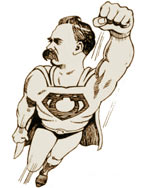Friedrich Nietzsche On the Nature of Truth
Wednesday, October 11, 2006 → by Danieru
Here Lies the Value of Truth:

What, then, is truth? A mobile army of metaphors, metonyms, and anthropomorphisms—in short, a sum of human relations which have been enhanced, transposed, and embellished poetically and rhetorically, and which after long use seem firm, canonical, and obligatory to a people: truths are illusions about which one has forgotten that this is what they are; metaphors which are worn out and without sensuous power; coins which have lost their pictures and now matter only as metal, no longer as coins.Here Lies the Value of Mankind:

Here one may certainly admire man as a mighty genius of construction, who succeeds in piling an infinitely complicated dome of concepts upon an unstable foundation, and, as it were, on running water. Of course, in order to be supported by such a foundation, his construction must be like one constructed of spiders' webs: delicate enough to be carried along by the waves, strong enough not to be blown apart by every wind. As a genius of construction man raises himself far above the bee in the following way: whereas the bee builds with wax that he gathers from nature, man builds with the far more delicate conceptual material which he first has to manufacture from himself.Extracts taken from Friedrich Nietzsche's 1873 essay 'On Truth and Lying in an Extra-Moral Sense'
Categories: History, Quotes, People, Fiction, On the Nature of, Ideas, Human, Reality, Language
|
|

 Links
Links Subscribe via RSS!
Subscribe via RSS!


 Via Email
Via Email


October 11, 2006 6:13 PM
October 11, 2006 11:55 PM
October 12, 2006 3:04 PM
October 13, 2006 1:59 AM
I am currently reading a book by British Philosopher John Gray, whose fiercely critical analysis of modern secular, humanist belief bares a striking resemblance to some of Nietzsche's more 'rebellious' comments about religion.
Something tells me Nietzsche would see today's world and conclude little has changed since his heady days of cynicism.
Such is the cynic's prerogative
October 15, 2006 9:12 PM
Post a Comment